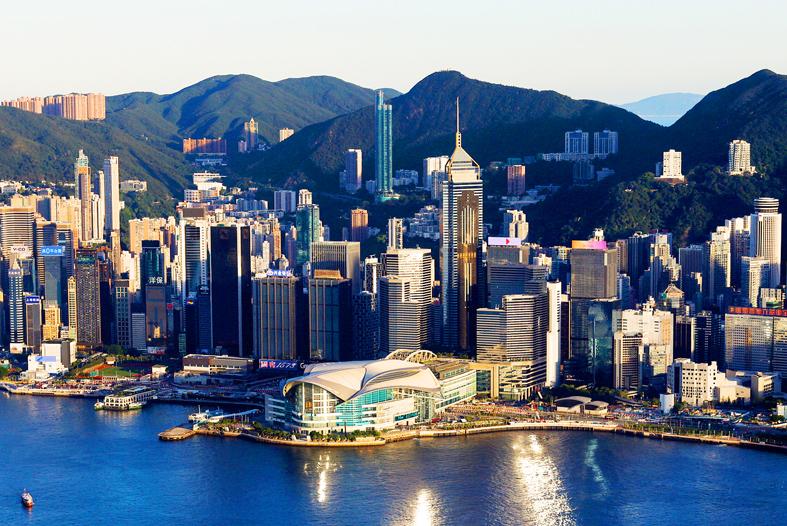Hong Kong police are reportedly investigating the group that organizes an annual protest march marking the territory’s handover to China for possible contravention of the territory’s National Security Law.
Police are gathering evidence and could take action against the Civil Human Rights Front, which holds the July 1 march each year and also organized some of the bigger political protests that roiled the territory in 2019, Hong Kong Police Commissioner Raymond Siu Chak-yee (蕭澤頤) told the Ta Kung Pao daily in an interview published on Friday.
Siu told the newspaper that the group never formally registered with the government nor the police since it was established in 2002.

Photo: Reuters
“Anyone who violates the law, they better not think they can escape,” Siu was quoted as saying.
A spokesperson for the Hong Kong Police Department did not immediately respond to a request for comment.
The group would be the latest target of a sweeping crackdown on dissent that has followed Beijing’s imposition of the National Security Law on the territory last year.
The legislation outlaws secession, subversion, terrorism and foreign collusion, and has been used to arrest more than 100 pro-democracy figures since it was implemented a year ago, as well as the closure of pro-democracy newspaper Apple Daily.
The crackdown has virtually silenced opposition voices in the territory — and drawn sanctions from the US against Hong Kong and Chinese government officials.
The South China Morning Post newspaper on Friday reported that the Civil Human Rights Front had decided to disband, but did not publicly announce the decision.
The group did not respond to requests for comment, while a public e-mail for the group returned an error message.
The group organized massive protests in June 2019 against a since-withdrawn extradition bill that would have allowed suspects in Hong Kong to stand trial in mainland China, where the judicial system is opaque.
Since the National Security Law was enacted, many unions, associations and political organizations have disbanded amid concerns that the law could be used to target them.
The territory’s largest teachers’ union — widely seen as pro-democracy — disbanded earlier this week, citing drastic changes in the political landscape.
Siu said in the interview that the Civil Human Rights Front had held multiple rallies in the past year that possibly contravened the security law, even as authorities previously said that the law was not retroactive.
The organization was previously targeted in a police probe in April over the legality of their operations.
Some of the most prominent members of the Civil Human Rights Front, including former leaders Figo Chan (陳皓桓) and Jimmy Sham (岑子杰), are in jail on charges related to their advocacy.
Chan was convicted of organizing an unauthorized assembly, while Sham has been remanded in custody since March over his involvement in an unofficial primary election last year that the authorities say was part of a plot to paralyze the government.

Conflict with Taiwan could leave China with “massive economic disruption, catastrophic military losses, significant social unrest, and devastating sanctions,” a US think tank said in a report released on Monday. The German Marshall Fund released a report titled If China Attacks Taiwan: The Consequences for China of “Minor Conflict” and “Major War” Scenarios. The report details the “massive” economic, military, social and international costs to China in the event of a minor conflict or major war with Taiwan, estimating that the Chinese People’s Liberation Army (PLA) could sustain losses of more than half of its active-duty ground forces, including 100,000 troops. Understanding Chinese

The Ministry of Foreign Affairs (MOFA) yesterday said it is closely monitoring developments in Venezuela, and would continue to cooperate with democratic allies and work together for regional and global security, stability, and prosperity. The remarks came after the US on Saturday launched a series of airstrikes in Venezuela and kidnapped Venezuelan President Nicolas Maduro, who was later flown to New York along with his wife. The pair face US charges related to drug trafficking and alleged cooperation with gangs designated as terrorist organizations. Maduro has denied the allegations. The ministry said that it is closely monitoring the political and economic situation

UNRELENTING: China attempted cyberattacks on Taiwan’s critical infrastructure 2.63 million times per day last year, up from 1.23 million in 2023, the NSB said China’s cyberarmy has long engaged in cyberattacks against Taiwan’s critical infrastructure, employing diverse and evolving tactics, the National Security Bureau (NSB) said yesterday, adding that cyberattacks on critical energy infrastructure last year increased 10-fold compared with the previous year. The NSB yesterday released a report titled Analysis on China’s Cyber Threats to Taiwan’s Critical Infrastructure in 2025, outlining the number of cyberattacks, major tactics and hacker groups. Taiwan’s national intelligence community identified a large number of cybersecurity incidents last year, the bureau said in a statement. China’s cyberarmy last year launched an average of 2.63 million intrusion attempts per day targeting Taiwan’s critical

‘SLICING METHOD’: In the event of a blockade, the China Coast Guard would intercept Taiwanese ships while its navy would seek to deter foreign intervention China’s military drills around Taiwan this week signaled potential strategies to cut the nation off from energy supplies and foreign military assistance, a US think tank report said. The Chinese People’s Liberation Army (PLA) conducted what it called “Justice Mission 2025” exercises from Monday to Tuesday in five maritime zones and airspace around Taiwan, calling them a warning to “Taiwanese independence” forces. In a report released on Wednesday, the Institute for the Study of War said the exercises effectively simulated blocking shipping routes to major port cities, including Kaohsiung, Keelung and Hualien. Taiwan would be highly vulnerable under such a blockade, because it